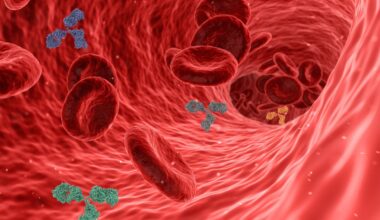Reflecting on Emotional Release and Transformation Through Detox Journaling
Detox journaling is a powerful practice that encourages individuals to explore their emotional landscape during the detox process. By writing down feelings, experiences, and revelations, you can gain insight into the effects of detox on your mental and emotional state. Many find that committing to a regular journaling routine fosters a deeper connection with themselves. This practice also promotes mindfulness, as focusing on thoughts and emotions helps in processing complex feelings that arise during detox. Capturing these reflections allows one to identify patterns and triggers contributing to emotional distress. Over time, this awareness can lead to significant transformation and healing. In addition, journaling serves as a private space to express feelings freely without judgment. Apart from emotional clarity, it can also assist in tracking changes throughout the detox process. For instance, documenting cravings, moods, and physical sensations creates an intricate map of your body’s responses, providing valuable insight into your journey. Through consistency, one can witness their evolution and cultivate a healthier relationship with food and self.
Creating a dedicated detox journal can enhance the overall experience of your cleansing journey. Start with an attractive notebook that inspires you, as its presentation can motivate consistent writing. Decorate your journal with images, quotes, or reminders that resonate with your intentions. Establish sections for different aspects of your detox journey; these might include daily reflections, meal logs, emotional observations, and physical symptoms. Structuring your journal this way can encourage comprehensive tracking. Additionally, writing prompts can facilitate deeper engagement with your thoughts. For instance, ask yourself how your cravings reflect deeper emotional needs, or describe moments of vulnerability during your journey. Consider noting positive affirmations in this space to bolster your motivation. With regular entries, you can look back and examine progress not solely in physical changes but also in emotional and mental growth. The act of writing can help solidify insights gained along the way, serving not only as a record but also as a witness to your journey. Ultimately, this can inspire gratitude for the transformative power of detoxification and provide encouragement for perseverance.
Understanding Emotional Blockages
During a detox program, individuals may encounter emotional blockages that surface as part of their cleansing process. These blockages can stem from various sources, including unprocessed trauma, stress, or unhealthy coping mechanisms. Recognizing these emotions is as essential as the physical detox itself. By engaging in detox journaling, you can delve into the root causes of these feelings. Writing allows for reflection on past experiences or current anxieties that may impact your detox experience. Be honest with yourself in your writing; express your fears, joys, and uncertainties without holding back. This openness can help in releasing pent-up emotions, making way for healing. As you navigate through challenging emotions, practice self-compassion; acknowledge that it is normal to experience ups and downs. Your journal can become a sanctuary for these expressions, empowering you to confront and process these feelings. By acknowledging emotional blockages, you can work towards understanding them better, which fosters personal insight and ultimately promotes emotional resilience. Recognize that this journey is as much about addressing mental and emotional health as it is about physical well-being.
Gratitude can play a significant role in enhancing the detox journaling experience. By integrating gratitude reflections into your journaling practice, you can shift your focus from challenging feelings to more positive aspects of your detox journey. Start by listing three things you’re grateful for each day. This simple exercise fosters an appreciation for the small victories that are often overlooked during transformative periods. Whether it’s the support from friends, newfound energy levels, or learning to listen to your body, acknowledging these blessings cultivates a positive mindset. Gratitude journaling can also serve as a powerful tool to combat negativity. When feelings of doubt or disappointment arise, revisiting your gratitude list can help reframe your thoughts and emotions. Over time, this practice can develop emotional strength, enhancing your overall detox experience. Reflecting on specific instances that brought joy or contentment can deepen the therapeutic benefits of journaling. Explore what detoxing has taught you about balance and self-care, shifting your mindset toward the positive changes you are instilling in your life.
Setting Intentions for Your Detox
When beginning a detox journey, it’s vital to set clear intentions that guide your process. Intentions act as a compass, providing direction and focus as you navigate through challenges. Journaling allows you to articulate these intentions, making them tangible and accessible. Write down what you hope to achieve during this phase; whether it’s improved health, mental clarity, or emotional healing, be specific in your aspirations. Additionally, reflect on why these goals matter to you personally, as understanding the reasons behind your intentions can heighten commitment. Consider creating a vision board to accompany your journal, incorporating visuals that embody your goals. This combination can serve as a permanent reminder of your purpose throughout the journey. When struggles arise, revisiting your intentions can provide encouragement and motivation to continue. Embrace flexibility, allowing for changing intentions as you progress through your detox. This adaptability can be instrumental when confronting unexpected challenges. Share your intentions with a supportive community or therapist for added accountability and encouragement. Thus, setting intentions becomes a dynamic process that enhances your emotional and mental resilience.
As you progress in your detox journey, the practice of reflection becomes increasingly crucial. It allows for processing past experiences, emotions, and lessons learned throughout the journey. Journaling provides a structured medium to engage in this reflection, leading to deeper self-awareness and personal understanding. Schedule regular reflections; it could be weekly or bi-weekly, allowing a consistent time to evaluate your progress. During these reflections, revisit your initial intentions and assess how they relate to your current experiences. Consider exploring the most impactful lessons learned thus far, both in terms of health and emotional growth. This practice can reveal areas that need further attention or adjustment. It can also highlight positive developments, reinforcing your self-efficacy. Being mindful of your feelings and progress can foster gratitude towards yourself for making changes. If certain aspects of the detox are proving particularly difficult, acknowledge this and reflect on strategies to address these challenges. Ultimately, reflection not only supports emotional well-being but also encourages continued commitment to your detox journey. It becomes an opportunity for growth and renewal, guiding you toward lasting transformation.
Developing a Lasting Practice
To experience the full benefits of detox journaling, it is essential to cultivate a lasting habit. Start by establishing a consistent schedule; choose a time of day that works for you and dedicate it solely to journaling. Some individuals find mornings ideal for setting intentions and reflecting on how they feel, while others prefer evenings to recap the day. In addition to time, consider your environment. Find a cozy and distraction-free spot that encourages introspection and creativity. Personalize your journaling experience by including visual elements, such as drawings or stickers, which can enhance engagement. Setting clear goals for your journaling practice can also contribute to its sustainability. Whether that’s committing to write for a set number of minutes or focusing on specific topics, having concrete objectives can keep you motivated. Joining a community or finding an accountability partner can provide support and encouragement, further promoting continuation. Remember, detox journaling is a personal journey of exploration; allow it to evolve over time to reflect your changing needs and aspirations, ultimately embodying the transformative power of detoxification for both body and mind.
In conclusion, detox journaling serves as a vital tool for emotional release and transformation. Engaging in this practice facilitates deep self-reflection and promotes personal growth throughout the detox process. By documenting your feelings, experiences, and insights, you cultivate a greater understanding of the emotional landscape during detoxification. This comprehensive tracking enables not only emotional awareness but also empowers you to identify and confront challenges effectively. Integrating gratitude, intentions, and reflections further enhances the journaling experience, fostering positivity and commitment in your journey. As you develop a sustainable journaling practice, you open the door to continuous growth and change. Remember, this transformative journey is not solely about the physical body but also about nurturing the emotional and mental aspects that contribute to overall well-being. Embrace the process with an open heart, and let journaling guide you through the ups and downs of your detox experience. With dedication, you can emerge from this journey not just healthier but also deeply transformed, equipped with valuable insights that will serve you well beyond your detox phase.


